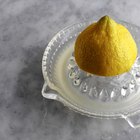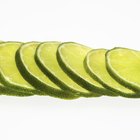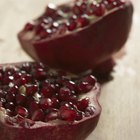
When the lemons on your counter are starting to look old and tired, it's probably time to juice them and discard the peels. Tucking a bottle of fresh-squeezed lemon juice into your fridge is the essential preliminary to a batch of really good lemonade, and it's also a supremely useful ingredient in cooking and baking. Unlike commercially bottled lemon juice, however, yours isn't pasteurized and stabilized for long-term storage in the refrigerator.
Fresh-Squeezed Juice
There's a reason why farmers markets and food courts are filled with vendors offering freshly-squeezed orange juice. Although premium frozen or not-from-concentrate brands are very good, they don't have the same flavor as a glass of juice that's just been squeezed from the fruit's pulp. That's because many of the flavor compounds that make citrus fruits taste so good are highly volatile. Once they're squeezed from the fruit's flesh and come in contact with oxygen, they begin to break down and dissipate.
Refrigerator Storage
A few of the volatile flavor compounds in lemon juice break down within minutes of squeezing, but most will last for a few days. If you plan to use your lemon juice in lemonade, those first few days are the ideal time. Your juice will retain enough of its fresh flavor to be useful in cooking or baking for up to two weeks, though sediment will begin to settle out. After that, although your lemon juice will remain food safe, its flavor deteriorates badly.
Longer Storage
If you have more lemon juice than you can conveniently use right away, freezing is a better option for long-term storage. Freeze your surplus in ice cube trays, then bag the cubes in heavy-duty freezer bags for later use. Alternatively you can freeze your lemon juice in larger containers or bags, pre-measured for specific recipes. For example, if your lemonade recipe calls for 2 cups of fresh-squeezed juice, freeze a few 2-cup packages for that use. For best flavor, thaw the juice overnight in your refrigerator rather than in the microwave. Well-wrapped lemon juice will retain most of its flavor for four to six months.
Juicing Tips
Juicers for citrus fruits range from high-tech motorized countertop gadgets to the old-fashioned wooden reamer, and chefs often use a fork if nothing better is at hand. Regardless of which tool you use for the job, you can get more juice from your lemons by following a couple of simple tips. First, warm lemons give more juice than cold lemons. If your lemons are refrigerated, warm them in a bowl of hot water or prick them a few times with a fork and zap them in the microwave for just a few seconds. Second, press down on each lemon with your hand and roll it on the counter a few times. That breaks the internal cell walls, and helps the lemons give up their juice more easily.
Related Articles

Can Expired Apple Juice Be Used for ...

How Long Does Tomato Juice Last After ...

What Is the Freezing Point of Fruit ...
How Long Can You Refrigerate Fresh ...

How to Make Lemonade Using Meyer Lemons

How to Thicken Raspberry Jam With ...

How to Infuse Vodka With Figs
Do You Defrost Frozen Peaches Before ...

How Long Can You Preserve Fresh ...

What Happens to Bananas Dipped in Lemon ...
How Long Is it Safe to Keep Frozen ...

How to Freeze a Prickly Pear Cactus

How to Store Lemons Long-Term

How to Dry Limes

Baking Cakes With Frozen Fruit

Homemade Limoncello Recipe

Can Drinking Old Vodka Hurt You?

How to Make Lemon Cologne
Does Lemon Juice Go Bad If Not ...

How to Keep Pomegranate Fresh
References
- On Food and Cooking: The Science and Lore of the Kitchen; Harold McGee
- Still Tasty: Lemon Juice -- Freshly Squeezed
Writer Bio
Fred Decker is a trained chef and certified food-safety trainer. Decker wrote for the Saint John, New Brunswick Telegraph-Journal, and has been published in Canada's Hospitality and Foodservice magazine. He's held positions selling computers, insurance and mutual funds, and was educated at Memorial University of Newfoundland and the Northern Alberta Institute of Technology.
Photo Credits
Jupiterimages/Goodshoot/Getty Images